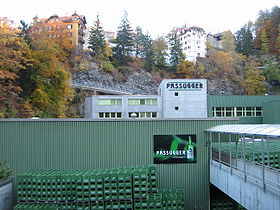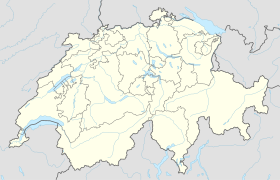Passugg
| Passugg | ||
|---|---|---|
| State : |
|
|
| Canton : |
|
|
| Region : | Plessure | |
| Political community : | Churwalden | |
| Postal code : | 7062 | |
| Coordinates : | 760 795 / 188765 | |
|
Passugg |
||
| map | ||
|
|
||
Passugg [pɐsːʼʊk] is a village in the canton of Graubünden in Switzerland . Politically it belongs to Churwalden .
geography
Passugg is located southeast of Chur at the entrance to Schanfigg and in the northernmost section of the municipality of Churwalden. The group of houses is located on a spur between the valley of the Plessur and the ravine of the Rabiusa (also called Rabiosa , German: the raging ), which is called Landwasser in German and flows into the Plessur below Passugg.
On the other side of the Rabiusa is Araschgen , which politically belongs to Chur. In terms of transport, Passugg is developed through Tschiertscherstrasse .
Denominations
Denominationally, the population is mixed and professes half of the Reformed and half of the Roman Catholic denomination. The local church is located in Araschgen and two thirds belong to the Reformed and one third to the Catholics. The Reformed, along with their fellow believers in Tschiertschen and Praden, belong to the Steinbach parish, while the Catholics are part of the Chur cathedral parish.
swell
The place became famous for its Passugger mineral water . The five springs in the Rabiosa Gorge were first mentioned in 1562 and rediscovered in the 19th century. Mineral water has been bottled and sold at the current location since 1951. In 1998, the Rheinfelder Feldschlösschen brewery , which in turn belongs to the Danish beer group Carlsberg in Copenhagen, acquired the majority stake. In 2000, the company was integrated into the Feldschlösschen Group together with the neighboring Bündner Rhäzünser mineral spring . In 2005, a group of local investors took over the two important Graubünden brands Allegra (Quellort Malix ) and Passugger (Quellort Passugg) from Feldschlösschen Getränke AG and transferred them to a purely Graubünden company, Allegra Passugger Mineralquellen AG. The company not only fills mineral water into beverage bottles, but also produces for the beverage industry. For example, As the cider Möhl from Arbon mineral water for its beverage production, including for Shorley ( apple juice ).
Kurhaus
The healing springs of Passugg were rediscovered in 1863 by the Chur master saddler Ulrich Sprecher. The Kurhaus, built in 1883, has been extensively renovated twice due to the large number of visitors (elevator, electrical lighting, flush toilets). In 1910 the Kurhaus had 220 beds. A path led down into the gorge to the spring building with the pump room. The different springs allowed different cures depending on the composition of the water.
The spa operation was discontinued in 1979. The international Graubünden hotel and tourism school, Swiss School of Tourism and Hospitality , is now housed in the former Kurhaus . Until June 2011, the village had a primary school run as a day school. It also has the Fontana educational facility for the deaf .
One historical figure who died in the Kurhaus Passugg was August Bebel on August 13, 1913 . Two weeks earlier he had gone there for a cure on the advice of his doctor. He seemed to be on the mend, but then unexpectedly succumbed to a long-standing heart condition. The Swiss author Hans Peter Gansner, who lives in Geneva and Haute-Savoie (France), chose the hotel in a historical drama in 2013 as the venue for the encounter between Bebel and his daughter Frieda and contemporary fighters for socialism, supplemented by a prelude and epilogue, the plays in the 1960s.
Individual evidence
- ↑ Rabiosa
- ↑ Passugger
- ^ Jost Camenzind, Hans Peter Treichler , Otto Knüsel, Lilian Jaeggi-Landolf, Hansjörg Schmassmann: Thermal baths of Switzerland. Offizin, Zurich 1990. ISBN 3-907495-11-X
- ↑ Terra Grischuna 3/2010
- ↑ History ( Memento of the original from April 27, 2008 in the Internet Archive ) Info: The archive link was inserted automatically and has not yet been checked. Please check the original and archive link according to the instructions and then remove this notice.
- ↑ Last day of school at the Passugg day school
- ↑ Urs Kälin: "The burial of the red emperor. The funeral ceremonies for August Bebel in Zurich 1913 in August 1913", in: HPGansner: Am Saum der Zeit or BEBELS TOD. Historical drama on the eve of the First World War . Dozwil: Thurgau 2014 (3rd supplemented edition), p. 114
- ^ H. P. Gansner: At the hem of time or BEBELS TOD. Historical drama on the eve of the First World War . Dozwil: Thurgau 2014 (3rd supplemented edition).
Web links
- Jürg Simonett: Passugg. In: Historical Lexicon of Switzerland .



